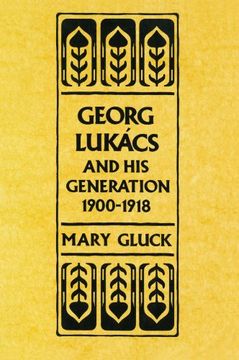Share
Georg Lukacs and his Generation, 1900-1918 (in English)
Mary Gluck (Author)
·
Harvard University Press
· Paperback
Georg Lukacs and his Generation, 1900-1918 (in English) - Mary Gluck
$ 32.80
$ 41.00
You save: $ 8.20
Choose the list to add your product or create one New List
✓ Product added successfully to the Wishlist.
Go to My WishlistsIt will be shipped from our warehouse between
Thursday, June 27 and
Monday, July 01.
You will receive it anywhere in United States between 1 and 3 business days after shipment.
Synopsis "Georg Lukacs and his Generation, 1900-1918 (in English)"
Mary Gluck introduces us to a Lukacs we have never met. Here is Lukacs among his friends, lovers, and peers in those important years before 1918, when he converted to Communism and Marxism at the age of thirty-nine. Georg Lukacs claimed in later life that his early achievements lacked genuine coherence, being expressions of a vague "romantic anticapitalism" that only found resolution in his conversion to Marxism. By integrating Lukacs with his early generational grouping and making expert use of a new treasure trove of documents from his early years, Gluck demonstrates that revolutionary socialism was not the inevitable outcome of Lukacs' early cultural radicalism, but only one of several possible options in the fragmented ideological climate of postwar Europe. From this new perspective, his pre-Marxist career takes on a cultural consistency that parallels and illuminates the inner strivings of the early modernists before the outbreak of World War I. Lukacs emerges in this generational portrait not only as dramatic and psychologically complex but also as a representative figure whose inner dilemmas were echoed in the lives of many other radical intellectuals who came of age during the fin de siecle period. Gluck situates Lukacs within a fascinating network of friends and associates, the so-called Sunday Circle, which included such people as Karl Mannheim, Arnold Hauser, Bela Balazs, and Anna Lesznai. She adeptly anchors this group within the context of social and economic transformations in Hungary that brought new conservative, antisemitic movements to the fore and that marginalized the assimilated Jewish middle classes to which Lukacs and most of his friends belonged. Retracing their collective hopes and values helps to clarify the far-ranging cultural crisis associated with the decline of nineteenth-century liberal culture and the emergence of the modernist sensibility.
- 0% (0)
- 0% (0)
- 0% (0)
- 0% (0)
- 0% (0)
All books in our catalog are Original.
The book is written in English.
The binding of this edition is Paperback.
✓ Producto agregado correctamente al carro, Ir a Pagar.

